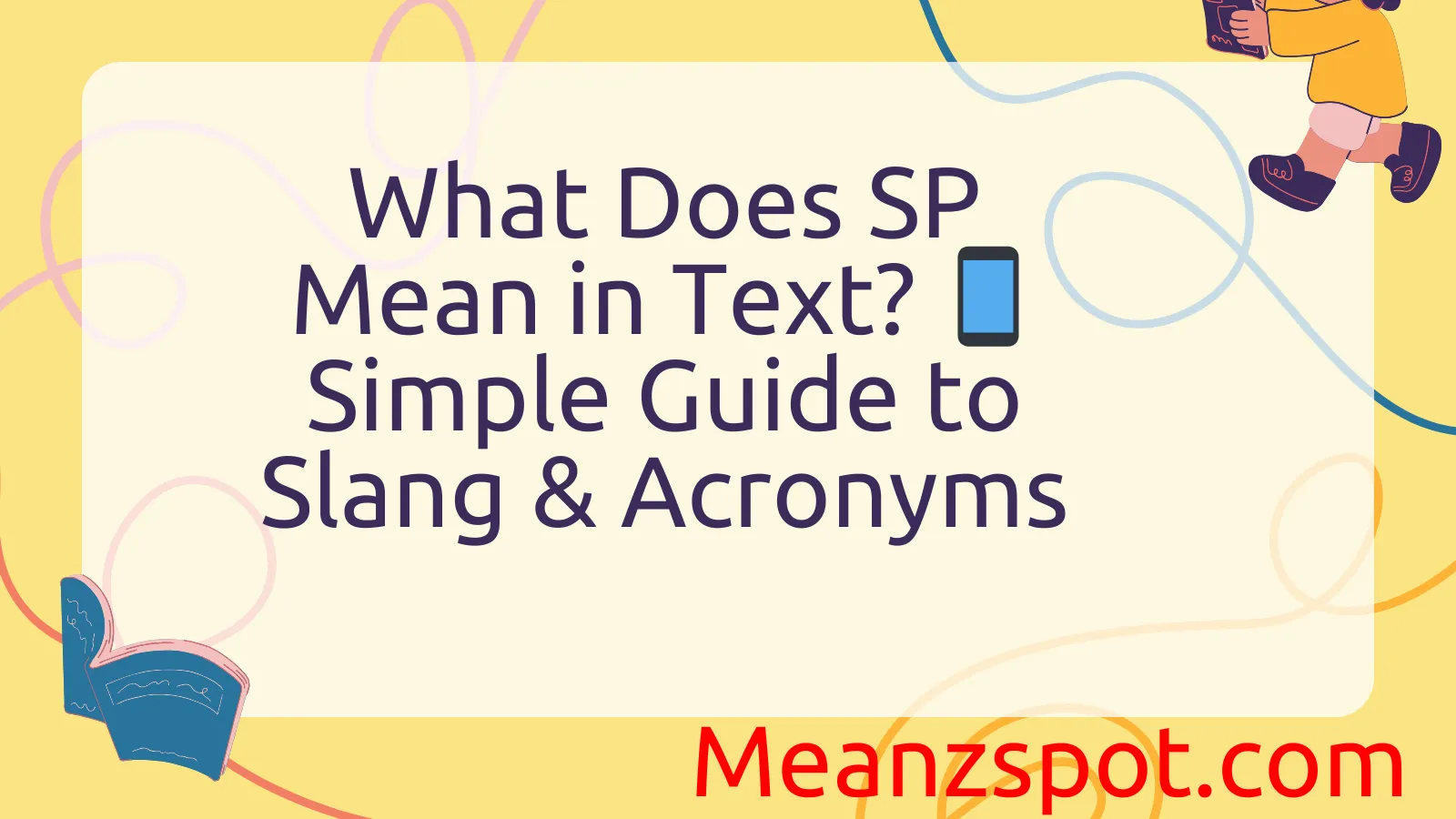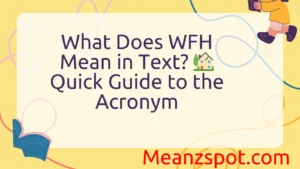Ever received a message with “SP” and found yourself scratching your head? 🤔 In today’s fast-paced digital world, texting and online chatting come with their own set of short forms and slang. SP is one of those abbreviations that can mean different things depending on the context. From casual conversations with friends to gaming chats, and even professional settings, SP pops up in ways that might surprise you.
In this guide, we’ll break down the different meanings of SP in text, show you real-life examples, and help you understand when and how to use it. Whether you’re trying to keep up with slang, decode a chat, or simply avoid confusion, this article will make SP crystal clear. ✅
Definitions & Meaning
“SP” is an abbreviation that can stand for various terms depending on context. In general text communication, “SP” most commonly means “Spell” or “Spelling.” It’s often used when someone wants to point out or correct a typo or spelling error in a message. For example:
- “You wrote ‘teh’ instead of ‘the.’ SP.”
In this sense, it’s shorthand for “spelling mistake.” However, “SP” also has other meanings in different settings:
- Social Media/Online Chat: “Soft Post” – referring to non-controversial or personal content.
- Gaming: “Skill Points” or “Special Points” – typically in role-playing games.
- Business: “Selling Price” – referring to the cost of an item after discounts or negotiations.
- Medical: “Standardized Patient” – used in medical training contexts.
Because the abbreviation is so versatile, it’s important to interpret it based on the tone, platform, and surrounding content of the message. The ambiguity is part of what makes “SP” both convenient and sometimes confusing.
Origins & History
The abbreviation “SP” has evolved over time and gained popularity through different subcultures and industries. In early online forums and gaming communities, “SP” was frequently used to refer to “Skill Points” or “Special Powers.” These were important attributes in RPGs (Role-Playing Games) where players had to allocate points to enhance characters’ abilities.
Meanwhile, in editorial and proofreading circles, “SP” took on a more practical role: an abbreviation for spelling errors. It was commonly used in red pen markups or digital notes to indicate where a misspelled word needed correction.
In business and retail environments, “SP” started appearing on invoices and price tags to denote “Selling Price.” It helped distinguish from other pricing terms like MRP (Maximum Retail Price) or CP (Cost Price).
As digital communication grew with SMS, instant messaging, and social media, “SP” was adopted by users who wanted a quick and efficient way to communicate specific concepts. Its rise in texting was largely organic, spreading through user communities and adapting to multiple linguistic needs.
Usage in Different Contexts
Because “SP” has multiple meanings, understanding the context in which it appears is crucial. Here’s how it’s used across various platforms:
1. Social Media
In platforms like Twitter, Instagram, and TikTok, “SP” can stand for:
- Soft Post: Often used to describe a light-hearted or emotionally vulnerable post, like a photo dump or personal reflection.
- “This is a little SP, but I really miss my dog today.”
- Sponsored Post: Sometimes used by influencers or marketers.
- “#ad #SP”
2. Texting & Chatting
In casual texting:
- Spelling: Used to point out or correct errors.
- “You meant ‘there’ not ‘their’. SP.”
3. Gaming
- Skill Points or Special Points: Used in character development or combat scenarios.
- “You need more SP to unlock that move.”
4. Business/Finance
- Selling Price: Common in invoices or pricing discussions.
- “SP: $299 after discount.”
5. Medical/Educational
- Standardized Patient: In medical training, actors simulate real patients.
- “We have an SP session tomorrow.”
The multiplicity of meanings shows how adaptable and widespread “SP” has become, but also underscores the need for contextual awareness.
Common Misunderstandings & Clarifications
Because “SP” is so versatile, it is also prone to misinterpretation. Here are some common misconceptions:
- SP always means “Sponsored Post”: While that’s one valid meaning in influencer culture, it’s not universal. In a gaming group chat, “SP” is far more likely to mean “Skill Points.”
- SP refers only to spelling: Although it originated this way in some circles, its use has broadened significantly.
- SP is an official abbreviation: While it’s widely recognized informally, “SP” is not an official abbreviation in all fields and may not be understood by everyone.
- All caps means formality: Not necessarily. In texting, capitalizing “SP” is often stylistic and does not signify a formal context.
- It’s industry-specific: True for terms like “Selling Price” or “Standardized Patient,” but not for general texting or social media use.
To avoid confusion, it’s helpful to consider the audience and platform. If you’re unsure what someone meant by “SP,” don’t hesitate to ask for clarification.
Alternatives & Synonyms
If you’re looking for alternatives to “SP,” here are some context-specific substitutes:
For Spelling:
- “Typo”
- “Misspelled”
- “Correction needed”
For Soft Post:
- “Emotional post”
- “Personal share”
- “Vulnerable moment”
For Skill Points:
- “XP” (Experience Points)
- “Attribute Points”
- “Ability Score”
For Sponsored Post:
- “Ad”
- “Promotion”
- “Paid partnership”
For Selling Price:
- “Final Price”
- “Discounted Rate”
- “Cost to Customer”
Using more explicit language instead of “SP” can reduce ambiguity, especially in professional or unfamiliar contexts.
Frequently Asked Questions (FAQ)
1. What does “SP” stand for in texting?
In casual texting, “SP” most often refers to “spelling” and is used to point out a typo or spelling error.
2. What does “SP” mean on social media?
It can mean “Soft Post” (personal or emotional content) or “Sponsored Post,” depending on the context.
3. Is “SP” used in professional communication?
Yes, in specific industries. In business, it can mean “Selling Price.” In medicine, it can mean “Standardized Patient.”
4. Can “SP” mean different things in the same conversation?
Yes, which is why understanding the context and tone of the conversation is important.
5. How do I know what someone means by “SP”?
Check the surrounding words, platform, and tone. If unclear, ask the sender directly.
6. Is “SP” commonly used in games?
Yes. In gaming, “SP” often stands for “Skill Points” or “Special Points” used for character development.
7. Should I avoid using “SP”?
Not necessarily. Just be mindful of your audience and make sure the meaning is clear.
Conclusion
“SP” is a versatile and widely-used abbreviation in modern digital communication. Its meaning can range from something as simple as “spelling” in a text message to complex terms like “Standardized Patient” in medical training or “Skill Points” in gaming. Because of its broad applicability, “SP” can be both useful and confusing. The key to interpreting it correctly lies in understanding the context in which it’s used.
By familiarizing yourself with the different meanings of “SP,” you can navigate conversations more effectively and avoid misunderstandings. Whether you’re chatting with friends, posting on social media, or managing a business transaction, recognizing the intent behind “SP” ensures your communication stays clear and purposeful.



